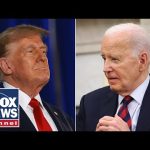In a recent discussion on a conservative news channel, the spotlight was on former President Trump and his plans for the Middle East, particularly regarding the Israeli-Palestinian conflict and the ongoing challenges with Iran. The conversation featured Republican voices endorsing Trump’s strategy and emphasizing the need for stability in the region.
Trump’s approach to the Gaza Strip has drawn attention. While details remain vague, it suggests a potential shift in U.S. engagement with one of the most contentious areas of the Middle East. The discussion highlighted the importance of U.S. involvement in ensuring Israel’s safety, with the underlying message that the United States is prepared to foster peace and stability in the region.
Regarding U.S. troops, Trump’s statements indicate that all options remain under consideration. This elicited support from those who believe a strong military presence is essential to deter aggression from nations hostile towards Israel and America. Trump’s approach is framed as one of strategic strength, contrasting with previous administrations that may have adopted a more passive stance.
However, practical challenges persist. The idea that all parties, particularly Palestinians, must agree to leave the Gaza Strip for it to be rebuilt faces significant hurdles. The involvement of neighboring countries, such as Saudi Arabia and Jordan, is crucial, especially as Saudi officials reaffirm their position on creating a Palestinian state. Diplomatic obstacles remain, with skeptics insisting that regional consensus is necessary for normalization and lasting peace.
The conversation also addressed the issue of Iran. Trump’s directive involves adopting a maximum pressure campaign against the Iranian regime, aiming to impede nuclear development. The discussion suggested that enforcing stringent sanctions and cutting off financial resources could effectively hinder Iran’s ambitions without resorting to appeasement strategies.
Trump’s proactive stance represents a contrast to past policies, embodying a belief that aggressive actions can hold rogue states accountable. Whether this approach will lead to peace and stability in the Middle East remains uncertain, but there is a clear call for a stronger U.S. role in international affairs. The message from Trump and his supporters emphasizes concrete steps toward ensuring allies like Israel can thrive safely while pressuring adversary states like Iran. As the political landscape evolves, the world watches closely to see how these strategies unfold.




